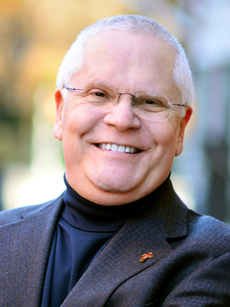Like Mary, believe the unbelievable

Deacon Greg Kandra
Living the Word / Deacon Greg Kandra
Fourth Sunday of Advent, Dec. 24
2 Samuel 7:1-5, 8b-12, 14a, 16; Psalms 89:2-3, 4-5, 27, 29; Romans 16:25-27; Luke 1:26-38
Do you hear it?
If there is one message the world needs right now, in a moment of high anxiety and seemingly unending wars, you can find it buried deep in this beautiful Gospel for the Fourth Sunday of Advent. In the story of the Annunciation, there is a second announcement, an added annunciation — a reminder of something so transcendent and persistent, we might easily forget about it.
The enduring annunciation here is the annunciation of hope.
You find it right there, at the end of the proclamation of an angel, who declares this news with the gusto and enthusiasm of someone who knows he is making history. This figure, Gabriel, stands before a young girl whose life is being rewritten and redirected right before her eyes and what does he do?
He leaves her — and us — with this message, his parting shot: “Nothing will be impossible for God.”
There you have it. All bets are off. Surrender your doubts, your questions, your worries and misgivings. Believe the unbelievable, he says. Embrace the mystery. Miracles are possible.
Hope is possible. Anything can — and will! — happen.
POSSIBILITY AND PROMISE
We all know what comes next. And this gospel, a prelude to Luke’s famous account of the Nativity that we will hear at Christmas, offers us a kind of late-Advent gift, one that we need to continue to unwrap day after day, in moments of shock or wonder or worry.
When all else fails, we need to hang on to these six words, the ones that likely sustained Mary not only for the months that followed, but for the next 30 years, through a flight into Egypt and agony on a hilltop: Nothing will be impossible for God.
Maybe we have forgotten that. Maybe we need to hear it, especially now. At this dark moment in time, what is being announced is light.
Mary, we’re told, was troubled at what she heard. Of course, she was troubled. Who wouldn’t be?
But what follows is a message that defies any doubt. In our moments of confusion, when we are troubled by what God brings to us, we have this to hold onto. It is the announcement of possibility and promise.
Angels will speak. The Spirit will come. A virgin will conceive. The world will be guided to a savior in a stable. And decades hence, the blind will see. The lost will be found. God will raise the dead.
“How can this be?,” Mary asks.
It can, because all things are possible. Because “impossible” is not part of God’s vocabulary.
A GOD WITHOUT LIMITS
There’s much that we don’t know about this episode from Luke’s gospel. We don’t know if other words were exchanged between Mary and Gabriel. We don’t know what happened immediately after this encounter. What’s a pregnant virgin to do? Did Mary share this news with anyone else before departing (in the next chapter) to visit her cousin Elizabeth? It’s intriguing to consider. Writers and movie directors have created an entire industry imagining moments that Luke left out of the story.
But all that overlooks the central meaning of this pivotal scene — and the profound message it offers in these last hours before we celebrate Christ’s coming into the world.
Our God is a God without limits. He is the God of possibility. That possibility can even bring about something as elusive and as consoling as peace.
In our world. In our country. In our hearts. Does it seem unlikely? Remote?
When worried or troubled, filled with fear or doubt, maybe we need to ask “WWMD?”
What would Mary do? Well, start by taking a cue from the Annunciation.
Hear the message within, the good news that defies logic, and hold on to what is really being announced.
In times of distress, we need to shut out the anxious noise of the world — and trust enough to listen to angels.
—
DEACON GREG KANDRA is an award-winning author and journalist, and creator of the blog, “The Deacon’s Bench.” His column is provided by OSV News.





